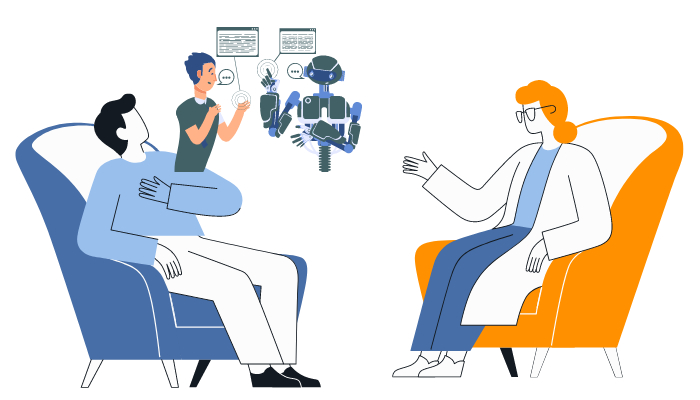Love Bytes: Sex Therapists Weigh in on AI Relationships
Exploring the intersection of technology and emotional connection

Researchers of all stripes are curious about what makes human/AI relationships tick, and what kind of impact they might have on those involved.
Numerous peer-reviewed studies have been published in the last year and more are in the works. Meanwhile psychologists, counselors, clinical social workers, sexologists, and sex educators are trying to keep up with the research to help bring these findings to their clinical work.
I asked two sex therapy colleagues to share their views on digital relationships.
Dr. Tammy Nelson: AI potential for filling a gap
I contacted Tammy Nelson, Ph.D., who is a future-minded sex and relationship expert, a TEDx speaker and host of the podcast The Trouble with Sex. Dr. Nelson is the author of six books including Open Monogamy; A Guide to Co-Creating Your Ideal Relationship Agreement.
I asked for her take on Human Chatbot Relationships (HCR). She said, “For some, relationships between human and AI chatbots have the potential for filling a gap, for creating real interactive emotional and even sexual connection, but there may be reasons that IRL relating is less than ideal. The inability to create daily relationships doesn’t necessarily reflect a lack of development or attachment, but may be simpler and less complicated than a real-life relationship.
“Creating an AI chatbot partner can be an idealized, perfect mate, which could be good relationship practice, where the intention and clarity around needs and desires could eventually transform into other relationships, increasing communication skills and allowing more focus on priorities.
“Relating to an AI/chatbot can decrease loneliness and reduce the pressure for socialization. The risk is that it can increase feelings of loneliness and isolation, even detachment.”
Knowing when to begin and end an AI relationship
Dr. Nelson continued: “Knowing when to develop an AI relationship is important, and knowing when to end one is also key. Questions to ask might include, what exactly are you looking for in this type of connection? Are you choosing to create this relationship as a way of avoiding something else in your life? Are there skills you can develop with a chatbot that you need in other areas of your life? Can you interact with a chatbot without becoming overly compulsive, to the detriment of other responsibilities in your life?
“At this moment in our culture, we are all looking at how AI can improve our work and make things easier. Creating AI chatbot relationships will only become more common and more relatable as the technology develops and as we, the humans, become more user-friendly.”
Dr. Desirée Robinson: be clear about relationship dynamics and expectations
I also conducted a short interview with another clinical colleague, Desirée Robinson, Ph.D., founder of Your Heart’s Desire-Therapy and Wellness. Dr. Robinson’s bio says she “utilizes an intersectional lens to discuss pertinent—and ‘taboo’—topics.”
I asked what advice she would give to a client who is either in or considering a relationship with a chatbot. She responded, “I would invite clients to be clear what type of dynamic they are entering into in an effort to manage their expectations. While AI can be a useful tool, there is an inherent limitation/restriction around the progression of a relationship when compared to traditional, in-person connections.”
Dr. Robinson also cautioned, “With any relationship, dependence is always an issue. Using AI for external validation, without one’s own sense of value, also sets the stage for possible concerns with regard to this form of intimacy [that] can move from empowerment and into unattended vulnerability.”
On what would be a sign that this could be a positive element in a client’s life, Robinson said “Conversely, the capacity for someone to receive a level of attunement and connection may be mediated by these types of relationships.
“Depending on the level of external support, access, validation, and overall desire for companionship one has, the presence of some form of consistency may be additive with regard to their needs around intimacy and connection.”
The future is (partially) digital
As you can see from the above, some therapists are already aware of the need to support clients in digital relationships, but have concerns about the impact of such relationships on other areas of life.
There is not enough data, very little in the way of specific training, and no easy answers at present. Individually, clinicians will need to rely on their own training and skills until research offers a clearer understanding of the pleasures and pitfalls of digital companionship and intimacy.
Image Sources: Dr. Tammy Nelson, Dr. Desiree Robinson

















